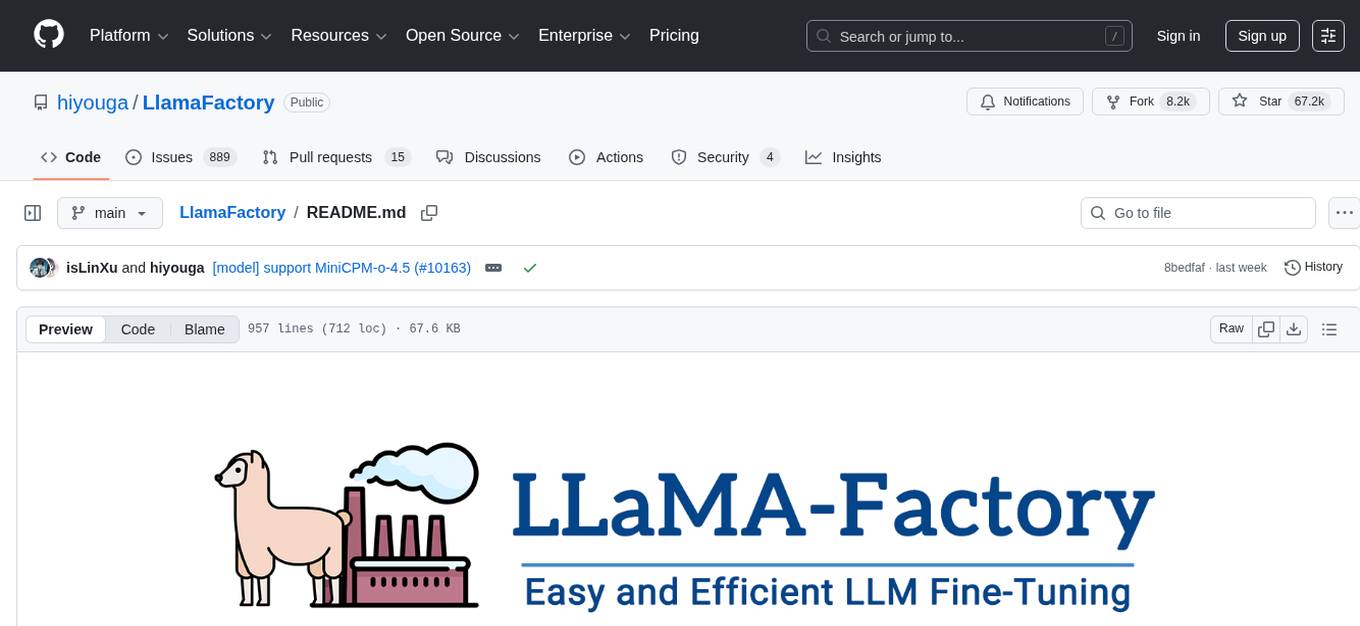
fastapi
企业级 LLM API 快速集成系统,支持OpenAI、Azure、文心一言、讯飞星火、通义千问、智谱GLM、Gemini、DeepSeek、Anthropic Claude以及OpenAI格式的模型等,简洁的页面风格,轻量高效且稳定,支持Docker一键部署。
Stars: 276
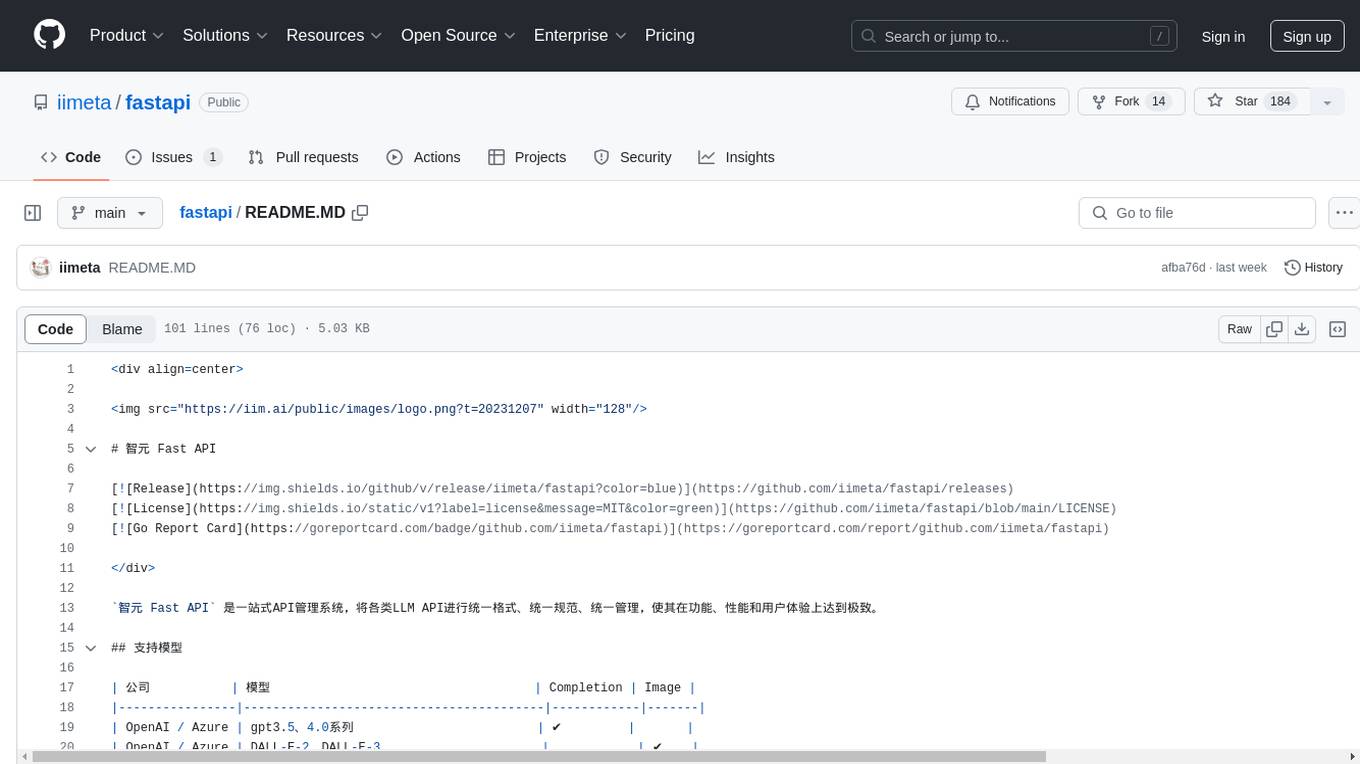
智元 Fast API is a one-stop API management system that unifies various LLM APIs in terms of format, standards, and management, achieving the ultimate in functionality, performance, and user experience. It supports various models from companies like OpenAI, Azure, Baidu, Keda Xunfei, Alibaba Cloud, Zhifu AI, Google, DeepSeek, 360 Brain, and Midjourney. The project provides user and admin portals for preview, supports cluster deployment, multi-site deployment, and cross-zone deployment. It also offers Docker deployment, a public API site for registration, and screenshots of the admin and user portals. The API interface is similar to OpenAI's interface, and the project is open source with repositories for API, web, admin, and SDK on GitHub and Gitee.
README:
企业级 LLM API 快速集成系统,支持DeepSeek、OpenAI、Azure、文心一言、讯飞星火、通义千问、智谱GLM、豆包、Gemini、Anthropic Claude以及OpenAI格式的模型等,简洁的页面风格,轻量高效且稳定,支持Docker一键部署。业务系统只需要按照统一API标准,对接一次的开发工作量,即可无缝对接N个大模型,无需考虑N个大模型背后的各种复杂逻辑等等,可大大降低开发和维护成本...
|
OpenAI |
Azure |
DeepSeek |
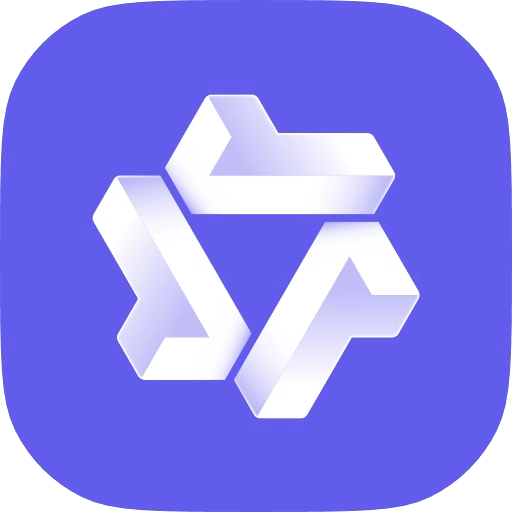 通义千问 |
 Gemini |
|
文心一言 |
智谱清言 |
火山引擎 |
 豆包 |
MiniMax |
|
Anthropic |
讯飞星火 |
Kimi |
 Grok |
硅基流动 |
curl --location 'https://api.fastapi.ai/v1/chat/completions' \
--header 'Content-Type: application/json' \
--header 'Authorization: Bearer sk-FastAPI1YzE0kXf0zNb0ldX1nBLDm1Bh0SoSK0G0PzR1tNxW' \
--data '{
"model": "gpt-5",
"stream": true,
"messages": [
{"role": "system", "content": "You are a helpful assistant."},
{"role": "user", "content": "hi"}
]
}'- 管理端: https://demo.fastapi.ai/admin
- 用户端: https://demo.fastapi.ai/login
- 代理商: https://demo.fastapi.ai/reseller
- 账号/密码均是: demo/123456
- 管理端: https://demo.fastapi.pro/admin
- 用户端: https://demo.fastapi.pro/login
- 代理商: https://demo.fastapi.pro/reseller
- 账号/密码均是: demo/123456
✔️ Docker部署
✔️ 集群部署
✔️ 多地部署
- 用户端: https://free.fastapi.pro/login
- 代理商: https://free.fastapi.pro/reseller
- API接口: https://api.free.fastapi.pro
- 注册就送 $1,000,000 额度, 支持注册代理商
| 仓库 | API | Web | Admin | SDK |
|---|---|---|---|---|
| 主库 | fastapi | fastapi-web | fastapi-admin | fastapi-sdk |
| 码云 | fastapi | fastapi-web | fastapi-admin | fastapi-sdk |
For Tasks:
Click tags to check more tools for each tasksFor Jobs:
Alternative AI tools for fastapi
Similar Open Source Tools

fastapi
智元 Fast API is a one-stop API management system that unifies various LLM APIs in terms of format, standards, and management, achieving the ultimate in functionality, performance, and user experience. It supports various models from companies like OpenAI, Azure, Baidu, Keda Xunfei, Alibaba Cloud, Zhifu AI, Google, DeepSeek, 360 Brain, and Midjourney. The project provides user and admin portals for preview, supports cluster deployment, multi-site deployment, and cross-zone deployment. It also offers Docker deployment, a public API site for registration, and screenshots of the admin and user portals. The API interface is similar to OpenAI's interface, and the project is open source with repositories for API, web, admin, and SDK on GitHub and Gitee.
helicone
Helicone is an open-source observability platform designed for Language Learning Models (LLMs). It logs requests to OpenAI in a user-friendly UI, offers caching, rate limits, and retries, tracks costs and latencies, provides a playground for iterating on prompts and chat conversations, supports collaboration, and will soon have APIs for feedback and evaluation. The platform is deployed on Cloudflare and consists of services like Web (NextJs), Worker (Cloudflare Workers), Jawn (Express), Supabase, and ClickHouse. Users can interact with Helicone locally by setting up the required services and environment variables. The platform encourages contributions and provides resources for learning, documentation, and integrations.
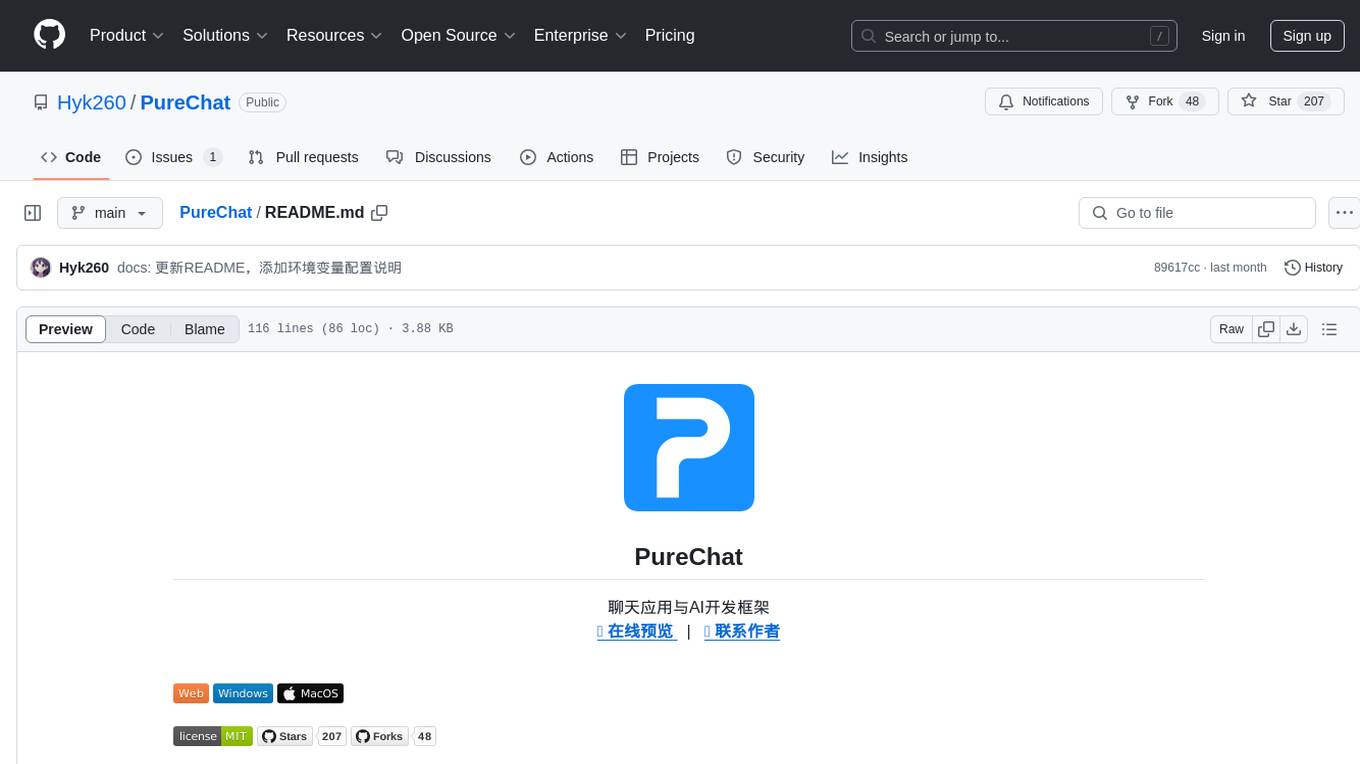
PureChat
PureChat is a chat application integrated with ChatGPT, featuring efficient application building with Vite5, screenshot generation and copy support for chat records, IM instant messaging SDK for sessions, automatic light and dark mode switching based on system theme, Markdown rendering, code highlighting, and link recognition support, seamless social experience with GitHub quick login, integration of large language models like ChatGPT Ollama for streaming output, preset prompts, and context, Electron desktop app versions for macOS and Windows, ongoing development of more features. Environment setup requires Node.js 18.20+. Clone code with 'git clone https://github.com/Hyk260/PureChat.git', install dependencies with 'pnpm install', start project with 'pnpm dev', and build with 'pnpm build'.
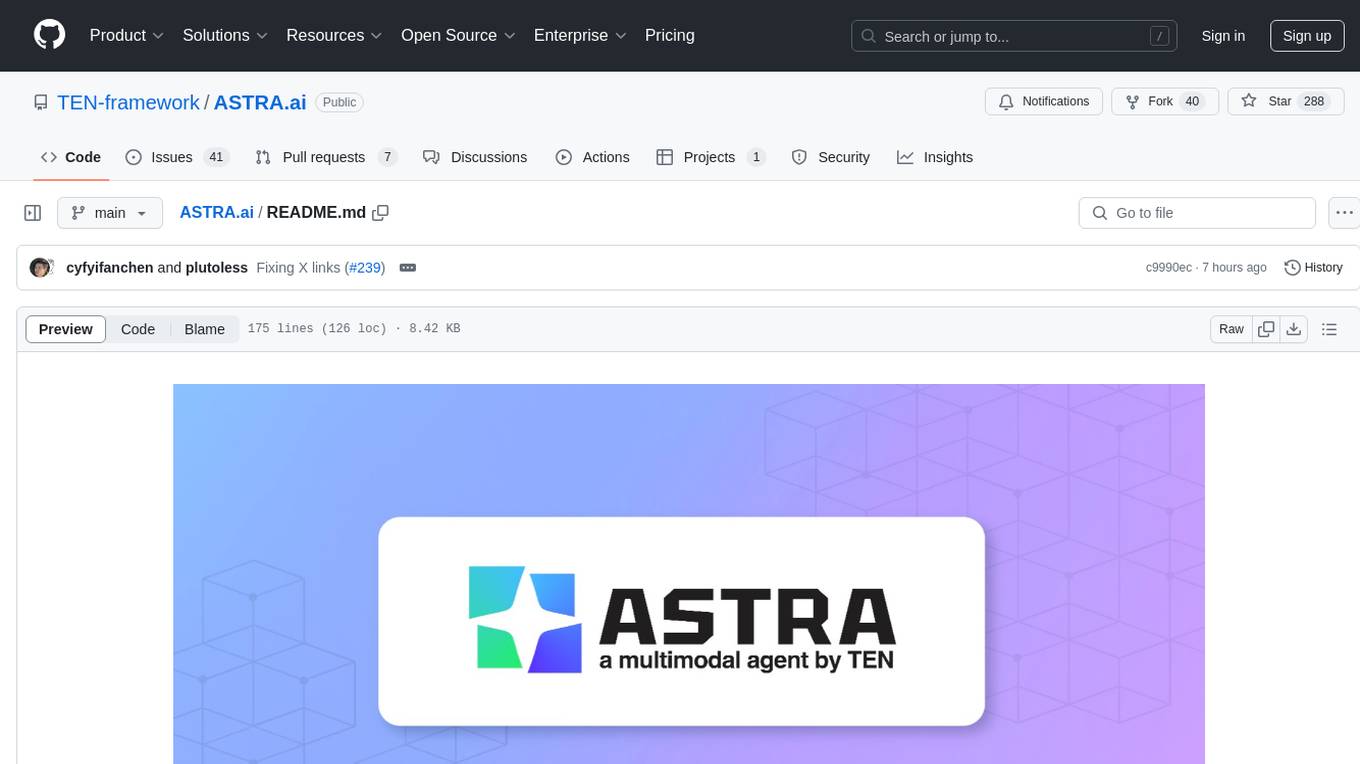
ASTRA.ai
Astra.ai is a multimodal agent powered by TEN, showcasing its capabilities in speech, vision, and reasoning through RAG from local documentation. It provides a platform for developing AI agents with features like RTC transportation, extension store, workflow builder, and local deployment. Users can build and test agents locally using Docker and Node.js, with prerequisites including Agora App ID, Azure's speech-to-text and text-to-speech API keys, and OpenAI API key. The platform offers advanced customization options through config files and API keys setup, enabling users to create and deploy their AI agents for various tasks.
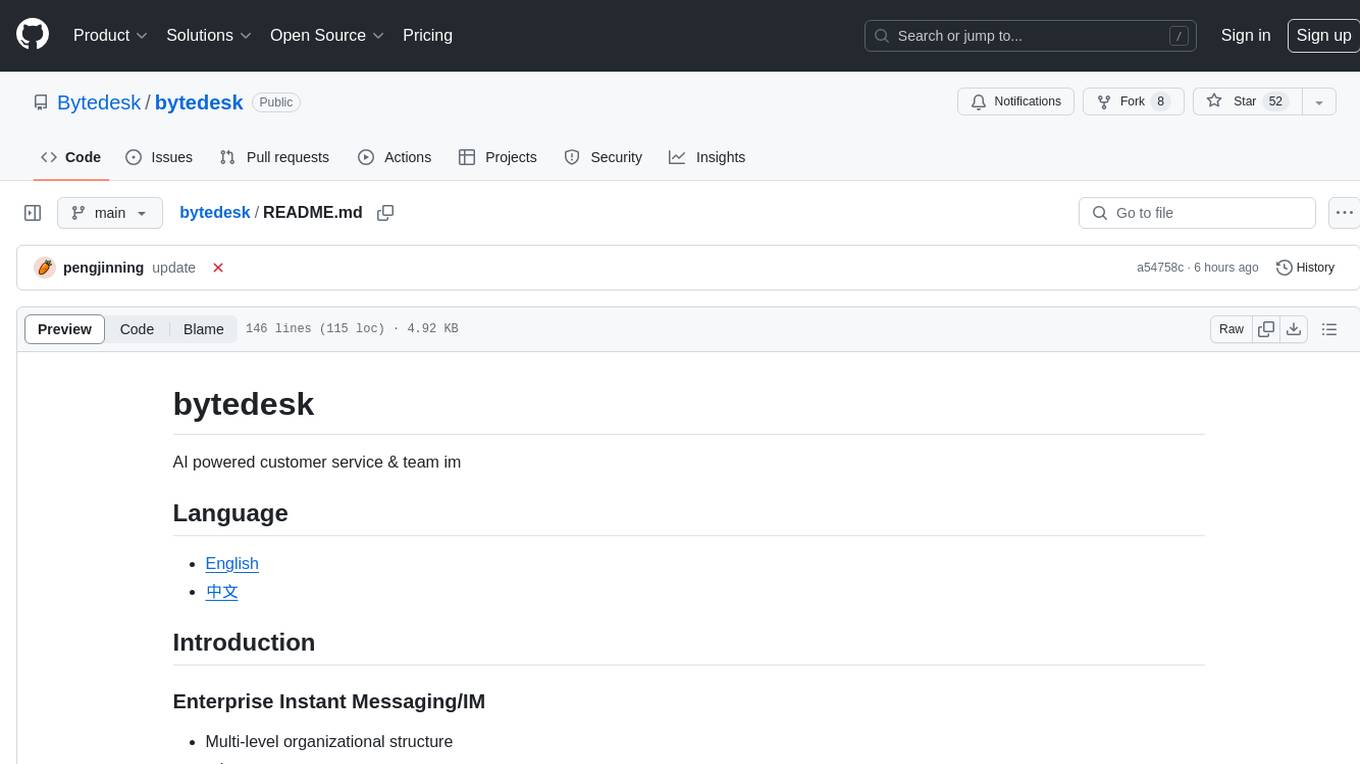
bytedesk
Bytedesk is an AI-powered customer service and team instant messaging tool that offers features like enterprise instant messaging, online customer service, large model AI assistant, and local area network file transfer. It supports multi-level organizational structure, role management, permission management, chat record management, seating workbench, work order system, seat management, data dashboard, manual knowledge base, skill group management, real-time monitoring, announcements, sensitive words, CRM, report function, and integrated customer service workbench services. The tool is designed for team use with easy configuration throughout the company, and it allows file transfer across platforms using WiFi/hotspots without the need for internet connection.
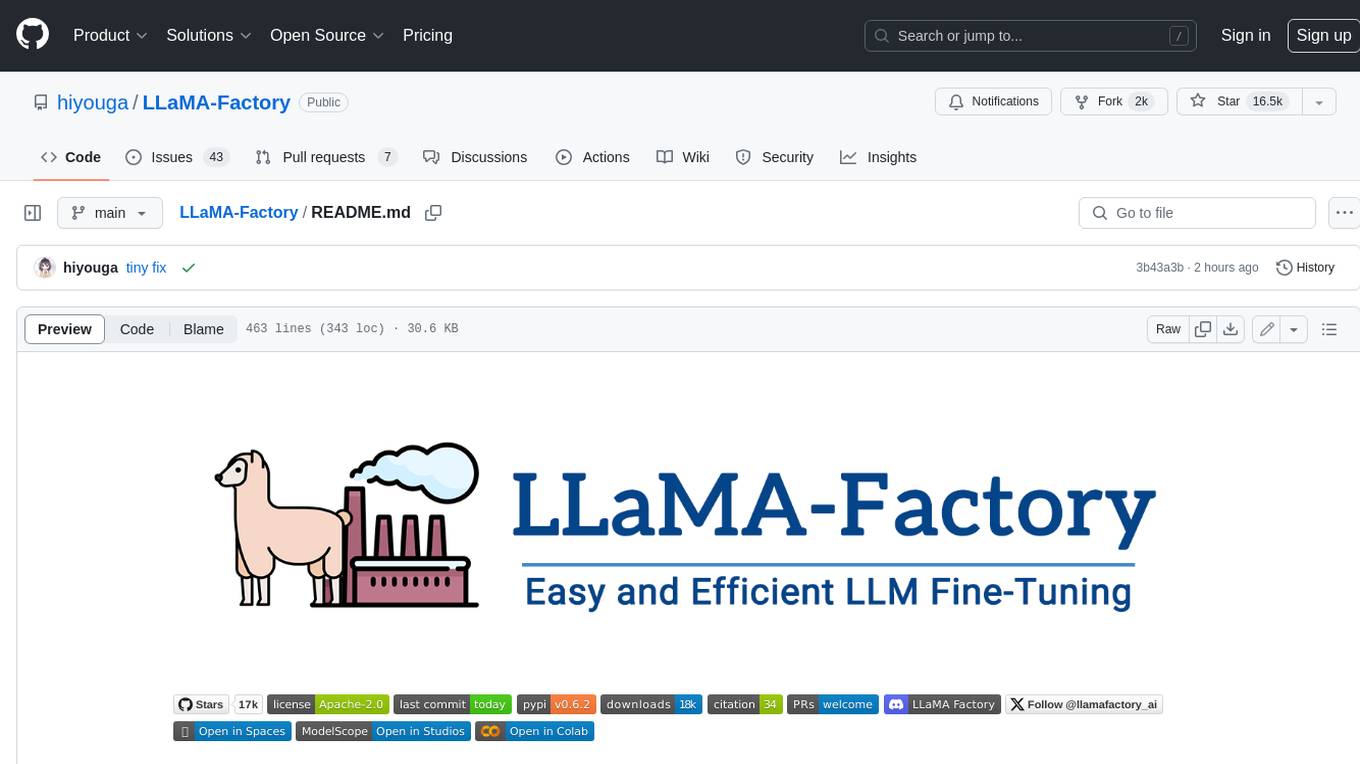
LLaMA-Factory
LLaMA Factory is a unified framework for fine-tuning 100+ large language models (LLMs) with various methods, including pre-training, supervised fine-tuning, reward modeling, PPO, DPO and ORPO. It features integrated algorithms like GaLore, BAdam, DoRA, LongLoRA, LLaMA Pro, LoRA+, LoftQ and Agent tuning, as well as practical tricks like FlashAttention-2, Unsloth, RoPE scaling, NEFTune and rsLoRA. LLaMA Factory provides experiment monitors like LlamaBoard, TensorBoard, Wandb, MLflow, etc., and supports faster inference with OpenAI-style API, Gradio UI and CLI with vLLM worker. Compared to ChatGLM's P-Tuning, LLaMA Factory's LoRA tuning offers up to 3.7 times faster training speed with a better Rouge score on the advertising text generation task. By leveraging 4-bit quantization technique, LLaMA Factory's QLoRA further improves the efficiency regarding the GPU memory.
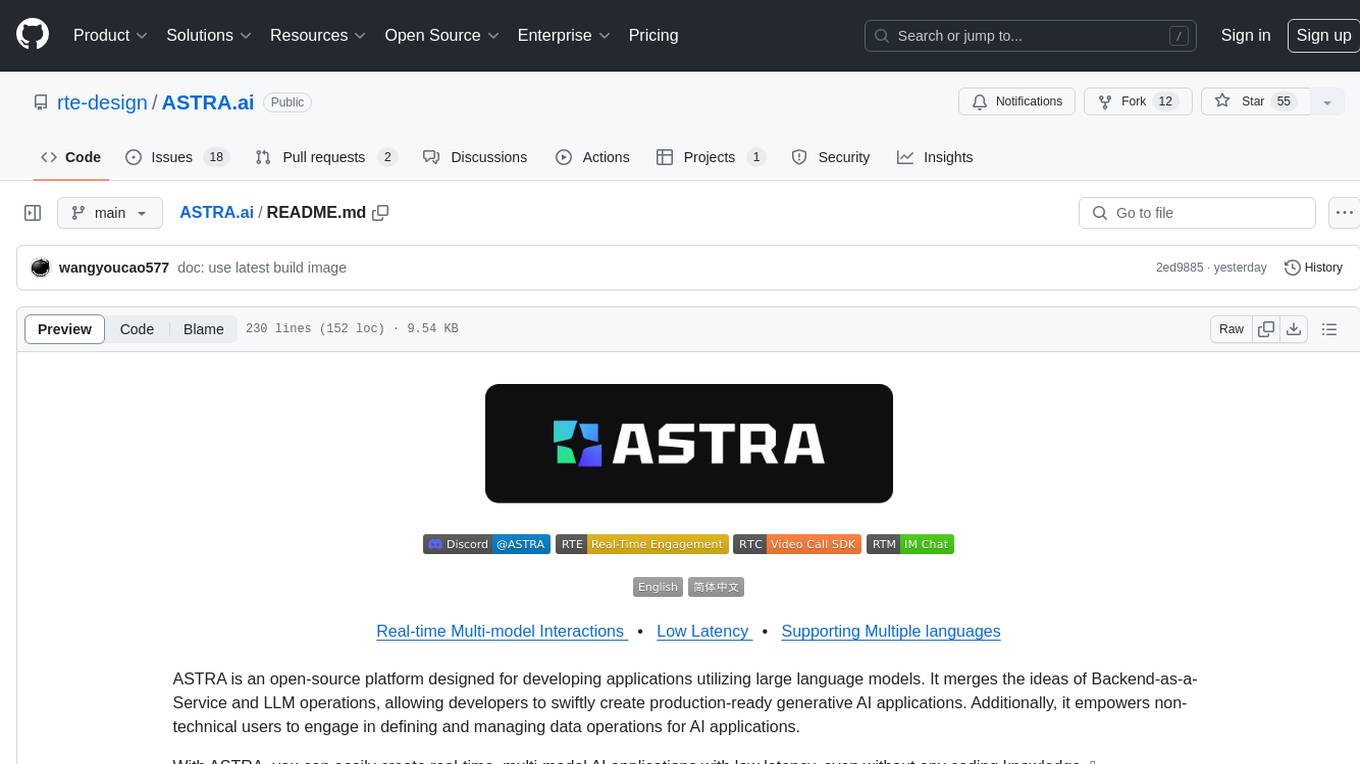
ASTRA.ai
ASTRA is an open-source platform designed for developing applications utilizing large language models. It merges the ideas of Backend-as-a-Service and LLM operations, allowing developers to swiftly create production-ready generative AI applications. Additionally, it empowers non-technical users to engage in defining and managing data operations for AI applications. With ASTRA, you can easily create real-time, multi-modal AI applications with low latency, even without any coding knowledge.
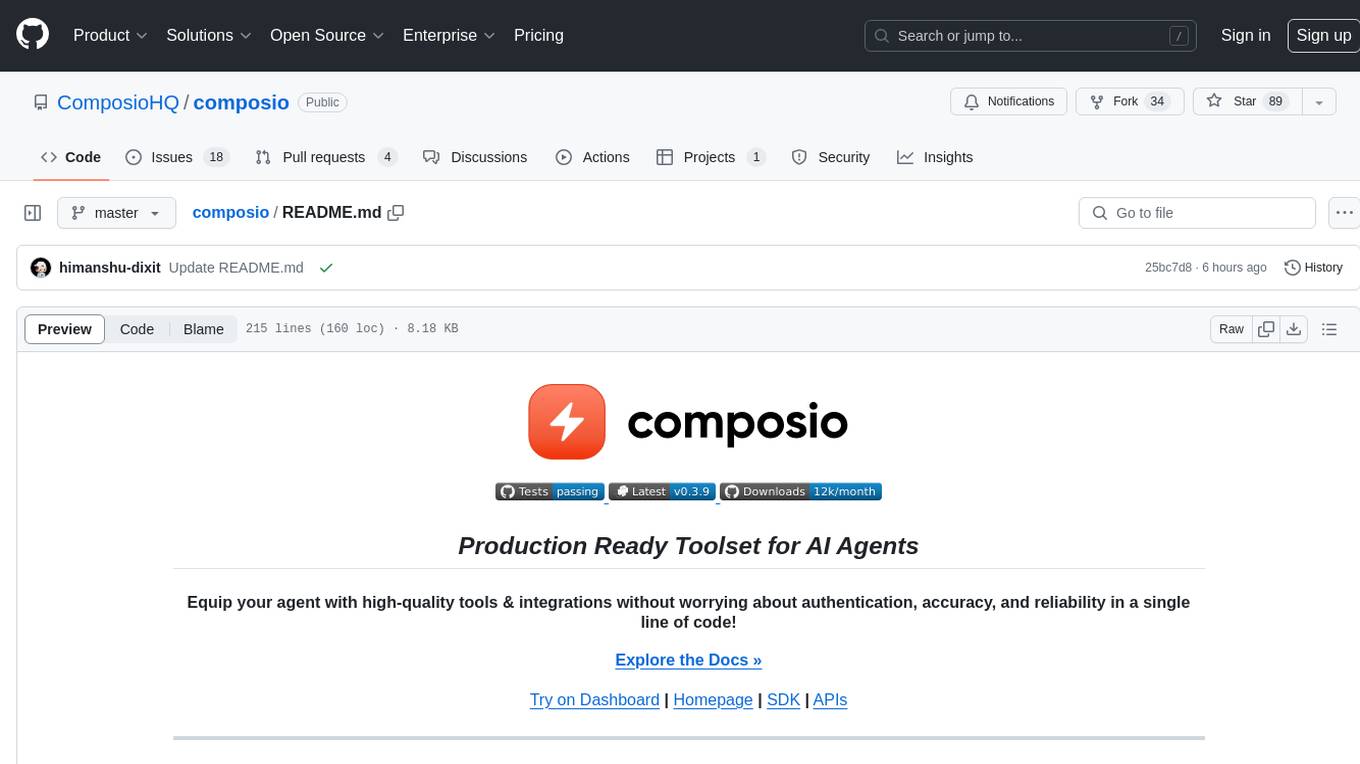
composio
Composio is a production-ready toolset for AI agents that enables users to integrate AI agents with various agentic tools effortlessly. It provides support for over 100 tools across different categories, including popular softwares like GitHub, Notion, Linear, Gmail, Slack, and more. Composio ensures managed authorization with support for six different authentication protocols, offering better agentic accuracy and ease of use. Users can easily extend Composio with additional tools, frameworks, and authorization protocols. The toolset is designed to be embeddable and pluggable, allowing for seamless integration and consistent user experience.
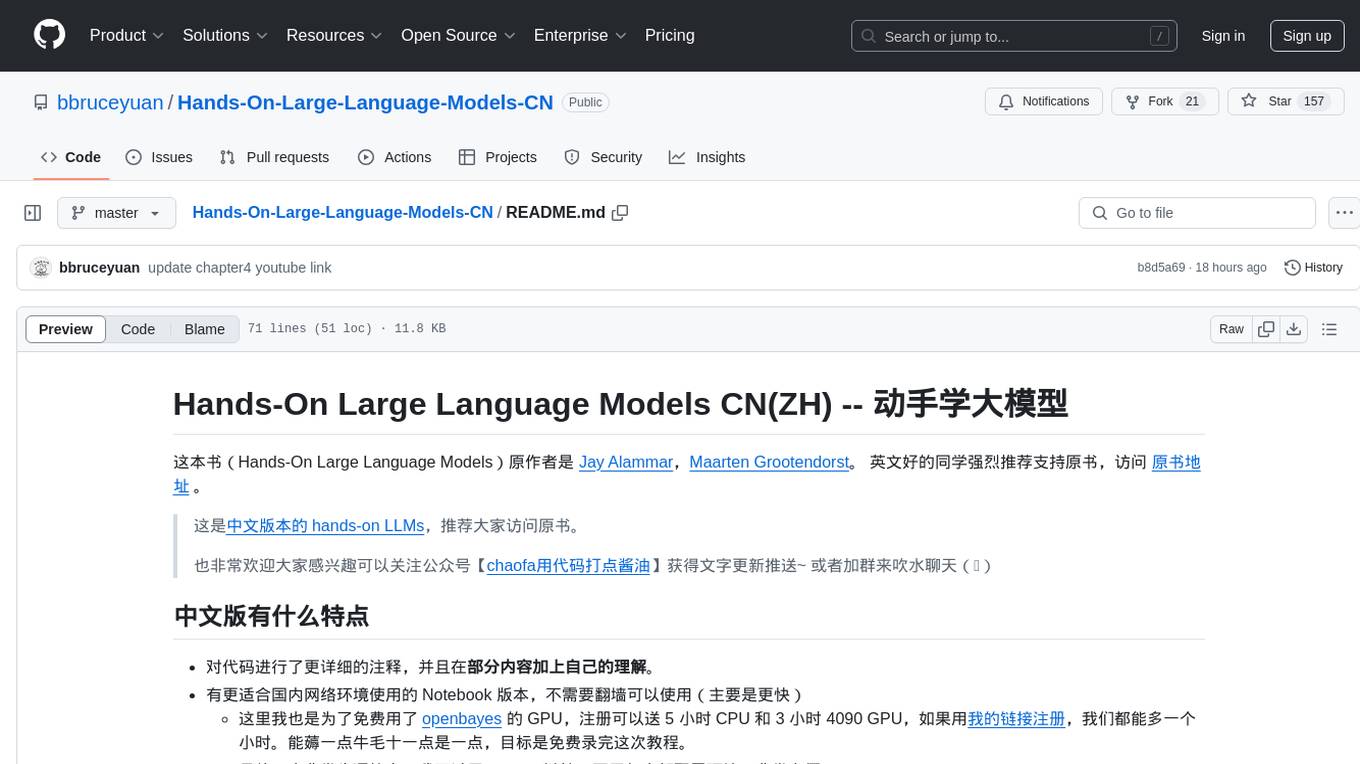
Hands-On-Large-Language-Models-CN
Hands-On Large Language Models CN(ZH) is a Chinese version of the book 'Hands-On Large Language Models' by Jay Alammar and Maarten Grootendorst. It provides detailed code annotations and additional insights, offers Notebook versions suitable for Chinese network environments, utilizes openbayes for free GPU access, allows convenient environment setup with vscode, and includes accompanying Chinese language videos on platforms like Bilibili and YouTube. The book covers various chapters on topics like Tokens and Embeddings, Transformer LLMs, Text Classification, Text Clustering, Prompt Engineering, Text Generation, Semantic Search, Multimodal LLMs, Text Embedding Models, Fine-tuning Models, and more.
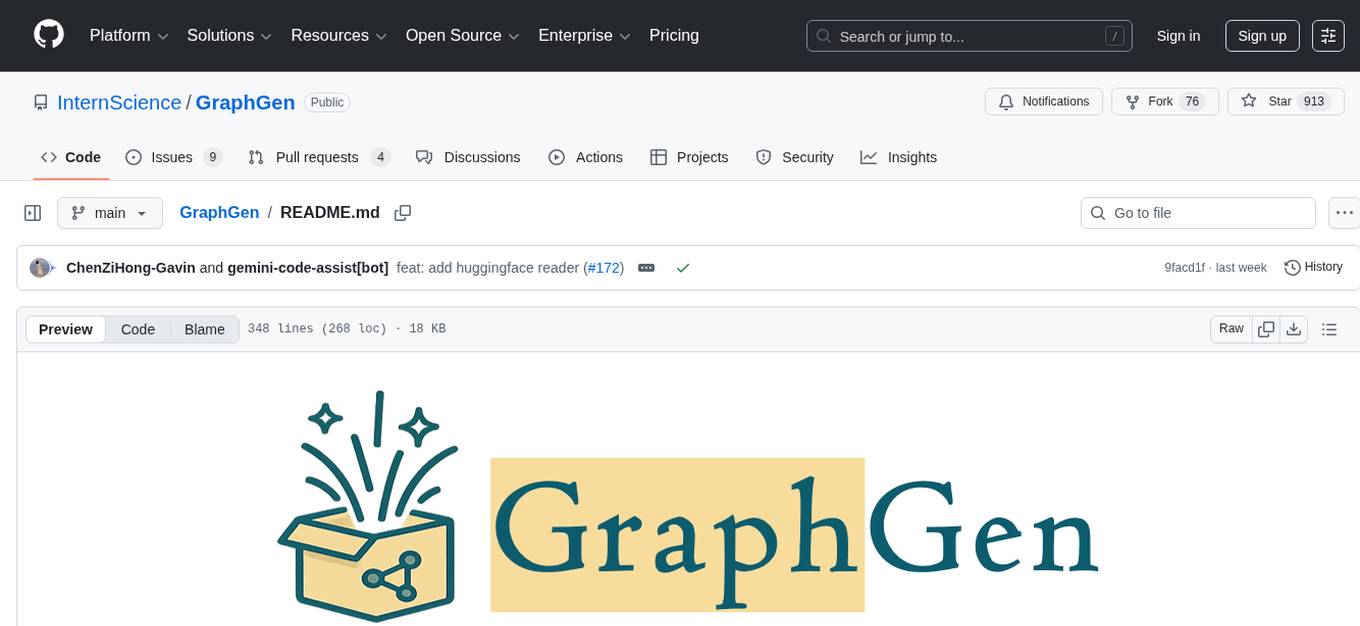
GraphGen
GraphGen is a framework for synthetic data generation guided by knowledge graphs. It enhances supervised fine-tuning for large language models (LLMs) by generating synthetic data based on a fine-grained knowledge graph. The tool identifies knowledge gaps in LLMs, prioritizes generating QA pairs targeting high-value knowledge, incorporates multi-hop neighborhood sampling, and employs style-controlled generation to diversify QA data. Users can use LLaMA-Factory and xtuner for fine-tuning LLMs after data generation.
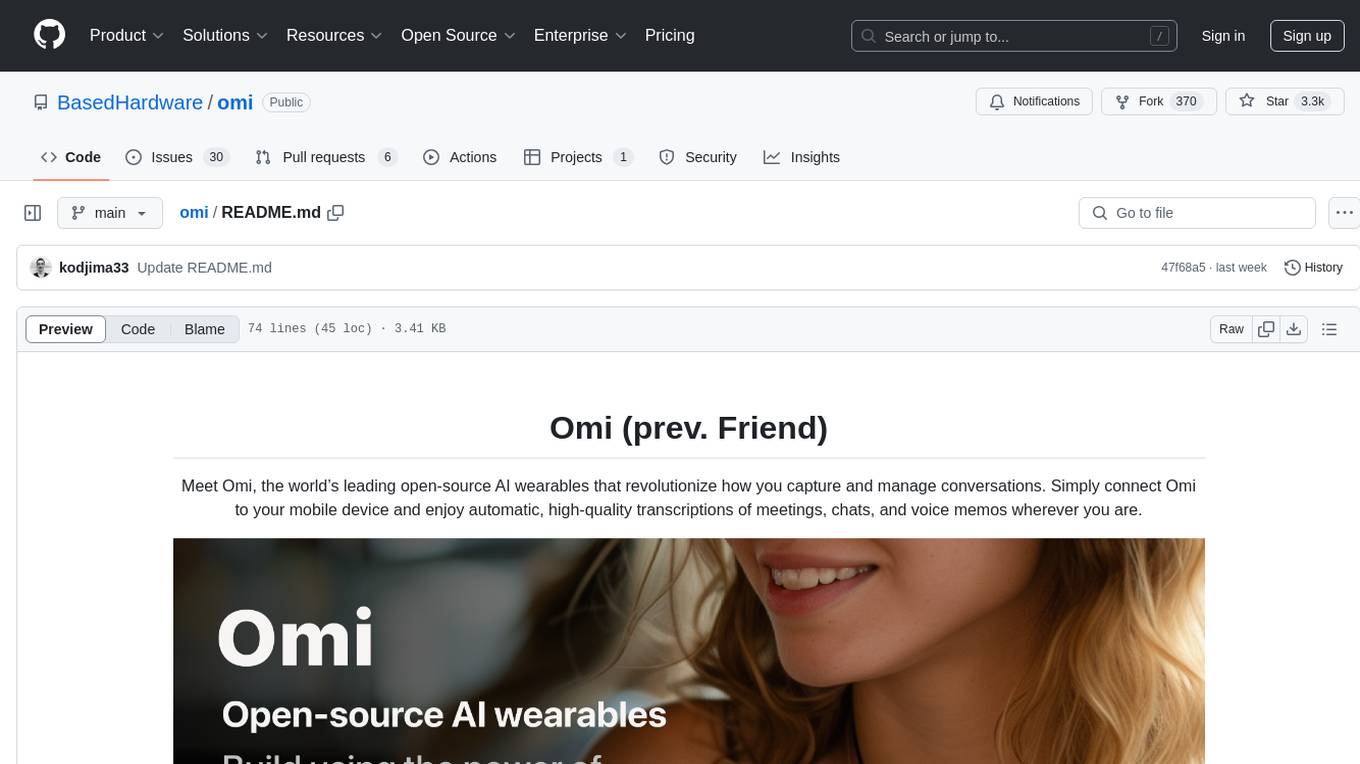
omi
Omi is an open-source AI wearable that provides automatic, high-quality transcriptions of meetings, chats, and voice memos. It revolutionizes how conversations are captured and managed by connecting to mobile devices. The tool offers features for seamless documentation and integration with third-party services.
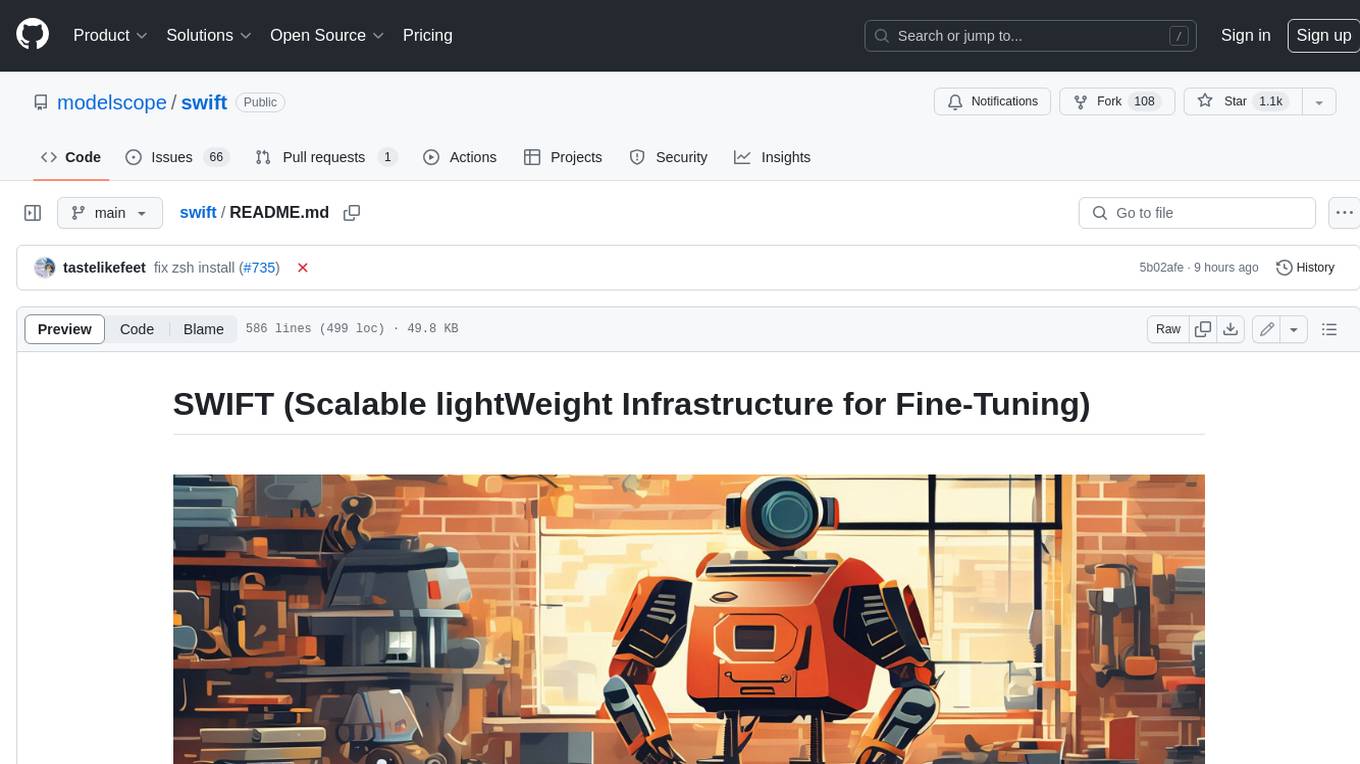
swift
SWIFT (Scalable lightWeight Infrastructure for Fine-Tuning) supports training, inference, evaluation and deployment of nearly **200 LLMs and MLLMs** (multimodal large models). Developers can directly apply our framework to their own research and production environments to realize the complete workflow from model training and evaluation to application. In addition to supporting the lightweight training solutions provided by [PEFT](https://github.com/huggingface/peft), we also provide a complete **Adapters library** to support the latest training techniques such as NEFTune, LoRA+, LLaMA-PRO, etc. This adapter library can be used directly in your own custom workflow without our training scripts. To facilitate use by users unfamiliar with deep learning, we provide a Gradio web-ui for controlling training and inference, as well as accompanying deep learning courses and best practices for beginners. Additionally, we are expanding capabilities for other modalities. Currently, we support full-parameter training and LoRA training for AnimateDiff.
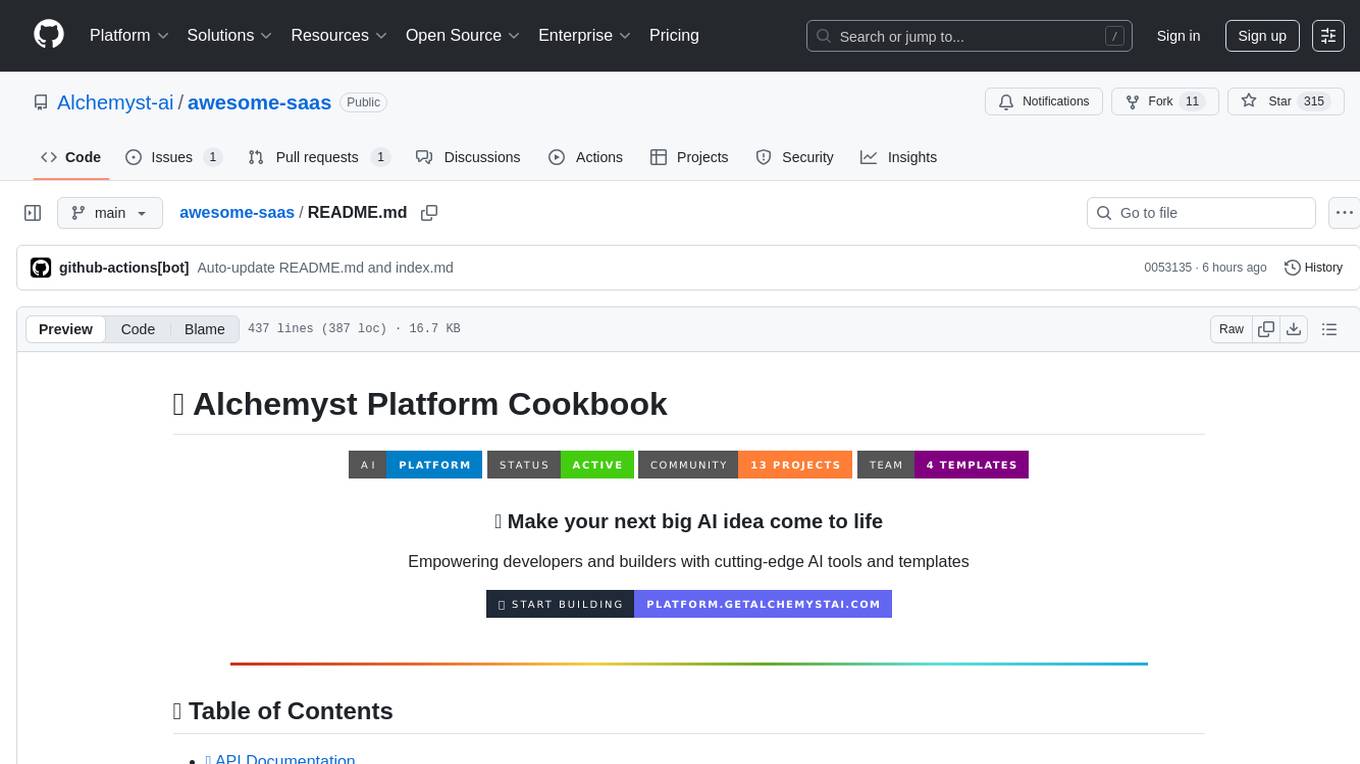
awesome-saas
The Alchemyst Platform Cookbook is a comprehensive guide for developers and builders to bring their AI ideas to life. It provides cutting-edge AI tools and templates to empower users in creating innovative projects. The platform offers API documentation, quick start guides, official and community templates for various projects. Users can contribute to the platform by forking the repository, adding the topic 'alchemyst-awesome-saas', making their repository public, and submitting a pull request. Troubleshooting guidelines are provided for contributors. The platform is actively maintained by the Alchemyst AI Team.
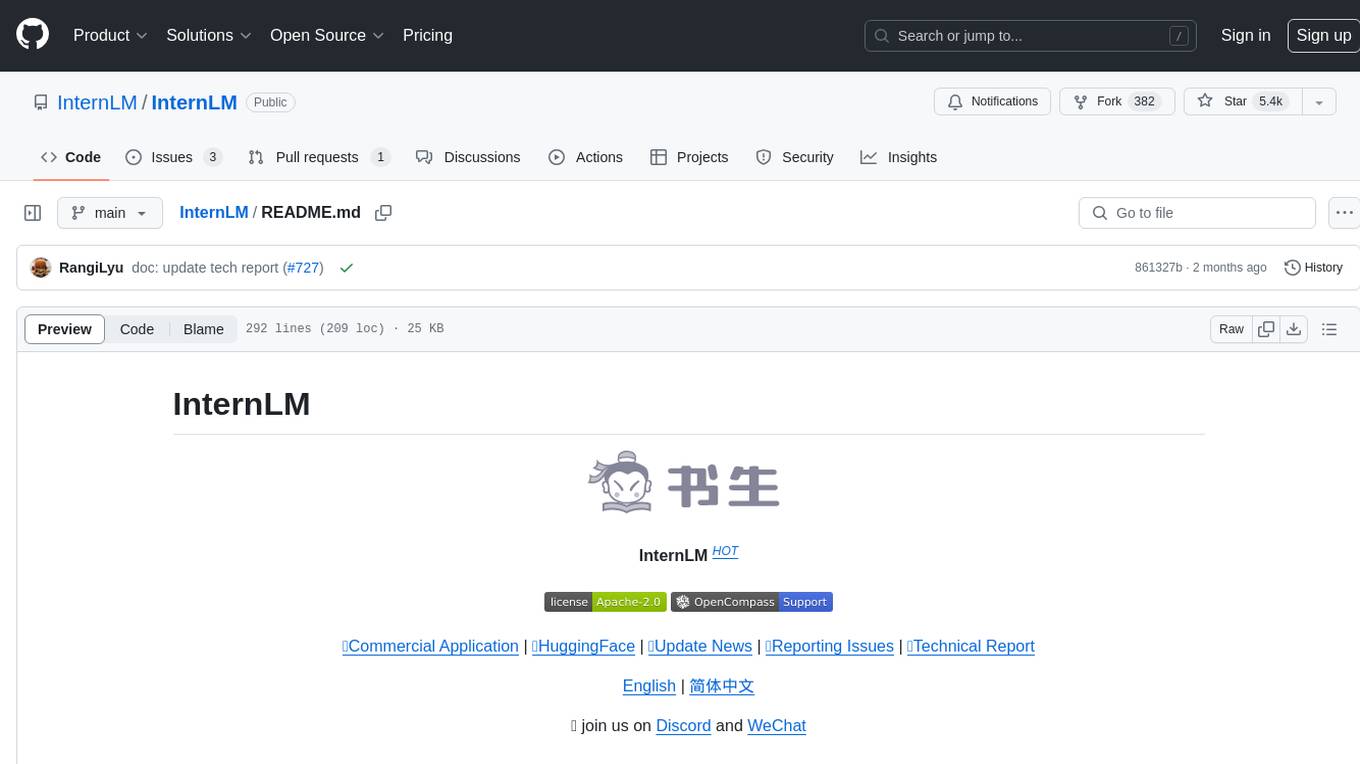
InternLM
InternLM is a powerful language model series with features such as 200K context window for long-context tasks, outstanding comprehensive performance in reasoning, math, code, chat experience, instruction following, and creative writing, code interpreter & data analysis capabilities, and stronger tool utilization capabilities. It offers models in sizes of 7B and 20B, suitable for research and complex scenarios. The models are recommended for various applications and exhibit better performance than previous generations. InternLM models may match or surpass other open-source models like ChatGPT. The tool has been evaluated on various datasets and has shown superior performance in multiple tasks. It requires Python >= 3.8, PyTorch >= 1.12.0, and Transformers >= 4.34 for usage. InternLM can be used for tasks like chat, agent applications, fine-tuning, deployment, and long-context inference.
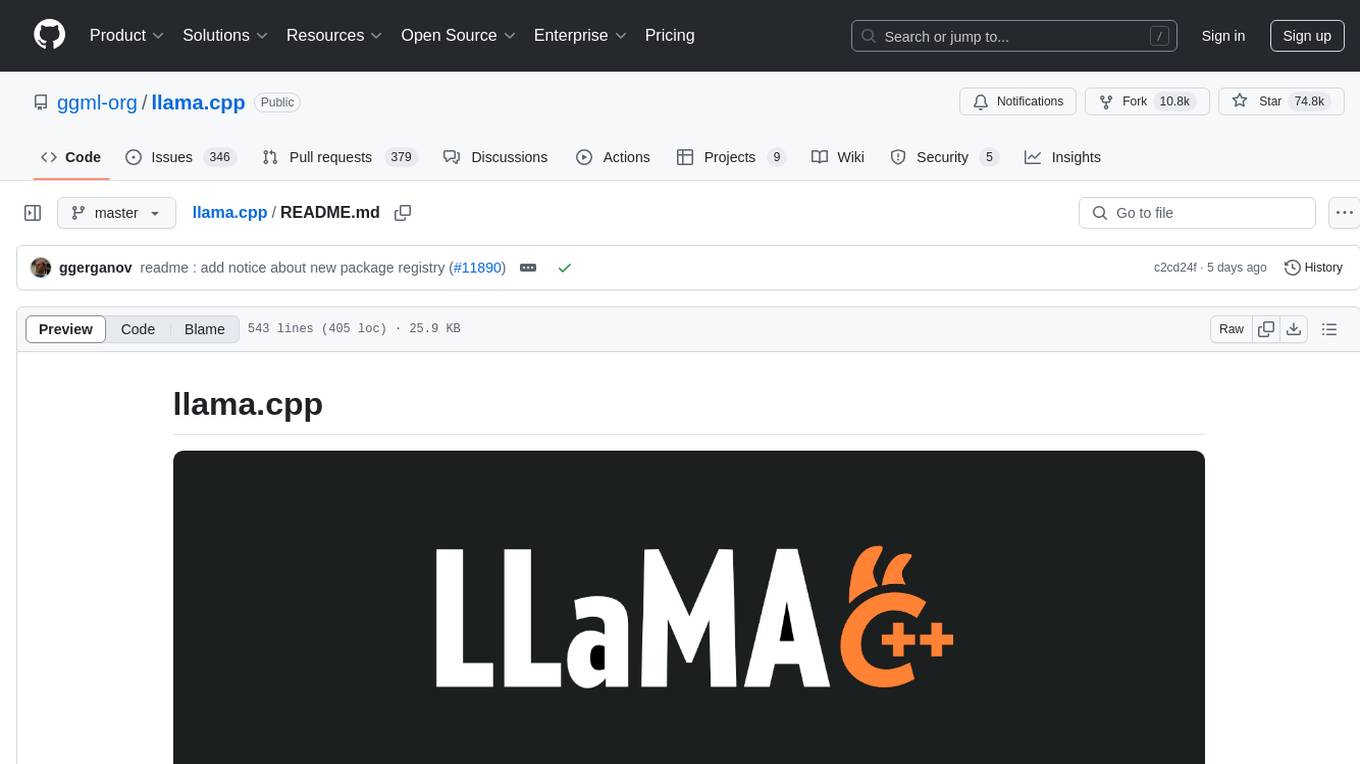
llama.cpp
The main goal of llama.cpp is to enable LLM inference with minimal setup and state-of-the-art performance on a wide range of hardware - locally and in the cloud. It provides a Plain C/C++ implementation without any dependencies, optimized for Apple silicon via ARM NEON, Accelerate and Metal frameworks, and supports various architectures like AVX, AVX2, AVX512, and AMX. It offers integer quantization for faster inference, custom CUDA kernels for NVIDIA GPUs, Vulkan and SYCL backend support, and CPU+GPU hybrid inference. llama.cpp is the main playground for developing new features for the ggml library, supporting various models and providing tools and infrastructure for LLM deployment.
For similar tasks

fastapi
智元 Fast API is a one-stop API management system that unifies various LLM APIs in terms of format, standards, and management, achieving the ultimate in functionality, performance, and user experience. It supports various models from companies like OpenAI, Azure, Baidu, Keda Xunfei, Alibaba Cloud, Zhifu AI, Google, DeepSeek, 360 Brain, and Midjourney. The project provides user and admin portals for preview, supports cluster deployment, multi-site deployment, and cross-zone deployment. It also offers Docker deployment, a public API site for registration, and screenshots of the admin and user portals. The API interface is similar to OpenAI's interface, and the project is open source with repositories for API, web, admin, and SDK on GitHub and Gitee.

ai-on-gke
This repository contains assets related to AI/ML workloads on Google Kubernetes Engine (GKE). Run optimized AI/ML workloads with Google Kubernetes Engine (GKE) platform orchestration capabilities. A robust AI/ML platform considers the following layers: Infrastructure orchestration that support GPUs and TPUs for training and serving workloads at scale Flexible integration with distributed computing and data processing frameworks Support for multiple teams on the same infrastructure to maximize utilization of resources

ray
Ray is a unified framework for scaling AI and Python applications. It consists of a core distributed runtime and a set of AI libraries for simplifying ML compute, including Data, Train, Tune, RLlib, and Serve. Ray runs on any machine, cluster, cloud provider, and Kubernetes, and features a growing ecosystem of community integrations. With Ray, you can seamlessly scale the same code from a laptop to a cluster, making it easy to meet the compute-intensive demands of modern ML workloads.

labelbox-python
Labelbox is a data-centric AI platform for enterprises to develop, optimize, and use AI to solve problems and power new products and services. Enterprises use Labelbox to curate data, generate high-quality human feedback data for computer vision and LLMs, evaluate model performance, and automate tasks by combining AI and human-centric workflows. The academic & research community uses Labelbox for cutting-edge AI research.

djl
Deep Java Library (DJL) is an open-source, high-level, engine-agnostic Java framework for deep learning. It is designed to be easy to get started with and simple to use for Java developers. DJL provides a native Java development experience and allows users to integrate machine learning and deep learning models with their Java applications. The framework is deep learning engine agnostic, enabling users to switch engines at any point for optimal performance. DJL's ergonomic API interface guides users with best practices to accomplish deep learning tasks, such as running inference and training neural networks.

mlflow
MLflow is a platform to streamline machine learning development, including tracking experiments, packaging code into reproducible runs, and sharing and deploying models. MLflow offers a set of lightweight APIs that can be used with any existing machine learning application or library (TensorFlow, PyTorch, XGBoost, etc), wherever you currently run ML code (e.g. in notebooks, standalone applications or the cloud). MLflow's current components are:
* `MLflow Tracking

tt-metal
TT-NN is a python & C++ Neural Network OP library. It provides a low-level programming model, TT-Metalium, enabling kernel development for Tenstorrent hardware.

burn
Burn is a new comprehensive dynamic Deep Learning Framework built using Rust with extreme flexibility, compute efficiency and portability as its primary goals.
For similar jobs

sweep
Sweep is an AI junior developer that turns bugs and feature requests into code changes. It automatically handles developer experience improvements like adding type hints and improving test coverage.

teams-ai
The Teams AI Library is a software development kit (SDK) that helps developers create bots that can interact with Teams and Microsoft 365 applications. It is built on top of the Bot Framework SDK and simplifies the process of developing bots that interact with Teams' artificial intelligence capabilities. The SDK is available for JavaScript/TypeScript, .NET, and Python.

ai-guide
This guide is dedicated to Large Language Models (LLMs) that you can run on your home computer. It assumes your PC is a lower-end, non-gaming setup.

classifai
Supercharge WordPress Content Workflows and Engagement with Artificial Intelligence. Tap into leading cloud-based services like OpenAI, Microsoft Azure AI, Google Gemini and IBM Watson to augment your WordPress-powered websites. Publish content faster while improving SEO performance and increasing audience engagement. ClassifAI integrates Artificial Intelligence and Machine Learning technologies to lighten your workload and eliminate tedious tasks, giving you more time to create original content that matters.

chatbot-ui
Chatbot UI is an open-source AI chat app that allows users to create and deploy their own AI chatbots. It is easy to use and can be customized to fit any need. Chatbot UI is perfect for businesses, developers, and anyone who wants to create a chatbot.

BricksLLM
BricksLLM is a cloud native AI gateway written in Go. Currently, it provides native support for OpenAI, Anthropic, Azure OpenAI and vLLM. BricksLLM aims to provide enterprise level infrastructure that can power any LLM production use cases. Here are some use cases for BricksLLM: * Set LLM usage limits for users on different pricing tiers * Track LLM usage on a per user and per organization basis * Block or redact requests containing PIIs * Improve LLM reliability with failovers, retries and caching * Distribute API keys with rate limits and cost limits for internal development/production use cases * Distribute API keys with rate limits and cost limits for students

uAgents
uAgents is a Python library developed by Fetch.ai that allows for the creation of autonomous AI agents. These agents can perform various tasks on a schedule or take action on various events. uAgents are easy to create and manage, and they are connected to a fast-growing network of other uAgents. They are also secure, with cryptographically secured messages and wallets.

griptape
Griptape is a modular Python framework for building AI-powered applications that securely connect to your enterprise data and APIs. It offers developers the ability to maintain control and flexibility at every step. Griptape's core components include Structures (Agents, Pipelines, and Workflows), Tasks, Tools, Memory (Conversation Memory, Task Memory, and Meta Memory), Drivers (Prompt and Embedding Drivers, Vector Store Drivers, Image Generation Drivers, Image Query Drivers, SQL Drivers, Web Scraper Drivers, and Conversation Memory Drivers), Engines (Query Engines, Extraction Engines, Summary Engines, Image Generation Engines, and Image Query Engines), and additional components (Rulesets, Loaders, Artifacts, Chunkers, and Tokenizers). Griptape enables developers to create AI-powered applications with ease and efficiency.





